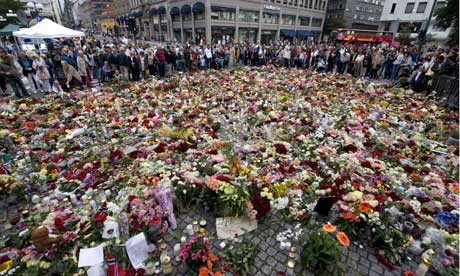Anders Behring Breivik had no legitimate grievance
Politicians should not use the Norway attacks to drag the idea of multicultural failure into mainstream acceptability

Anders Behring Breivik's victims are remembered at a makeshift memorial outside the Domkirken church in Oslo. Photograph: Jonathan Nackstrand/AFP/Getty Images
Despite the fact that Anders Behring Breivik was not permitted to publicly justify his actions in public on Monday, a scrambling defence of his repertoire of prejudice is already in full swing. Writing in the Wall Street Journal, Bruce Bawer, who is quoted by Breivik in his manifesto 2083: A European Declaration of Independence, emphasises his repeated warnings that a rightwing extremist may use violence to address "legitimate concerns about genuine problems". Bawer blames mainstream politics for failing to address the corrosion of Europe by Islamicisation and multiculturalism, meanwhile The Jerusalem Postcautions that "Oslo's devastating tragedy should not be allowed to be manipulated by those who would cover up the abject failure of multiculturalism".
Racism is often justified as an aberrant reaction to understandable provocation; the focus on "multiculturalism" in the aftermath of the Oslo tragedy draws attention to contemporary racism's most elastic alibi. The "failure of multiculturalism" is an article of faith in European politics and, like all acts of faith, it depends on the acceptance of an underlying mystery. Despite the denunciations of this "failed experiment", there has never been a time in Europe where multiculturalism was the dominant ideology. As Ralph Grillo has argued, state practices, in the few countries that have adopted them, are characterised by a "weak" patchwork of policy initiatives and aspirational rhetoric. Yet critics have consistently assumed the damaging existence of a coherent "strong" form, which is always "unbridled".
Multiculturalism has historically been accompanied by accusations of "reverse racism" and "unfairness to whites". Since 9/11, politicians and commentators have held it responsible for an extraordinary range of social and political problems. The overwhelming power attributed to this semi-fictional project, and the fact that it is often critcised in countries with small immigrant populations, with no real history of multiculturalism in practice, should give pause for thought.
It is widely recognised that racism underwent a change in the post-war period, shifting from being an ideology of racial hierarchy to one of "natural" cultural incompatability. The so-called "new racism" of far-right parties during the 1980s and 1990s ingested the language and logic of multiculturalism, and portrayed ordinary – white – people as victims of an elite imposition, hypocritically denied their "right to culture". These ideas are pressed into service in the emerging defence of Breivik's political despair. In extreme versions, multiculturalism is regarded as self-hatred, in more nuanced attacks as a laudable experiment that foundered on the rocks of their difference and "our" naive generosity. Both versions portray "multiculturalists" and "immigrants" as an internal threat to a given national culture, and an otherwise pristine state of social cohesion.
The vision of multiculturalism as a conspiratorial alliance between varieties of leftists and "Islamists" is a staple of the Islamophobic blogosphere. In his analysis of Breivik's document, Doug Sanders points to the influence of "Eurabian" writers such as Bawer, Mark Steyn, Melanie Phillips and Robert Spencer in agitating for a millenarian vision of a civilisation under attack. This début-de-siècle genre mirrors the fin-de-siècle European obsession with decadence and moral decay, the difference being that it is now Muslims, rather than Jews, that threaten to devour their tolerant hosts.
What makes the narrative of multicultural failure toxic, however, is its mainstream acceptability. There is no cordon sanitaire between the out-and-out Islamophobes and the political mainstream, and the past decade has proved that the traffic of ideas goes both ways. The myth of excessive generosity allows for tighter migration regimes, compulsory integration projects and neo-nationalist politics to be presented as nothing more than rehabilitation.
Recent recitations of the comforting narrative by the German chancellor, Angela Merkel, and Britain's prime minister, David Cameron, garnered significant publicity. More attention needs to be paid to the mainstream racism it has given legitimacy to elsewhere in Europe. The former Dutch immigration minister Rita Verdonk proposed a system of "integration badges" for immigrants. The former Danish prime minister Anders Fogh Rasmussen declared a "battle of culture" against multiculturalism and Islam, and his culture minister, Brian Mikkelsen, explicitly targeted a "medieval Muslim culture" in Denmark. Päivi Räsänen, the new Finnish interior minister, proposed prioritising Christian refugees in the interests of cohesion and to "prevent discrimination". While these examples are drawn from contexts now associated with far-right electoral successes, they illustrate how the alibi of an "utterly failed" multiculturalism has provided political capital to centrists and liberals for quite some time.
The political class should reflect before responding to the tragedy in Norway, particularly when "austerity" politics may make the scapegoating of immigrant-descended and Muslim groups worse. No easy connections can be made between the recorded thoughts of a killer and the complex circulation of political ideas. However, writers who have consistently warned of the need to defend an ailing civilisation have questions to answer when a massacre is explicitly justified in their terms. And mainstream politicians, content to lazily peddle an exaggerated story of multicultural excess and Muslim difference are not exempt from this criticism.

No comments:
Post a Comment